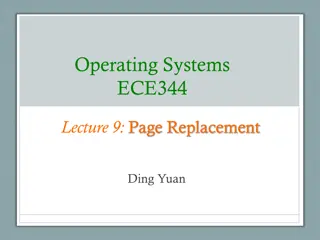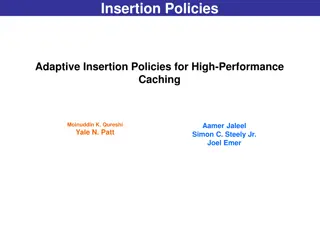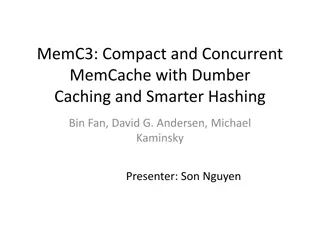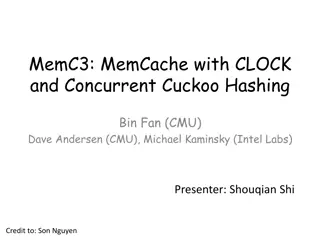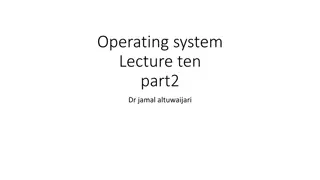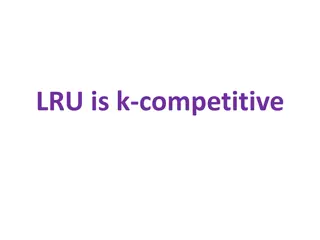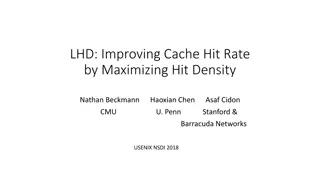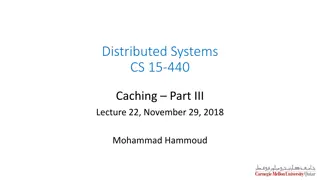Understanding Page Replacement in Operating Systems
Page replacement is a critical concept in operating systems, where memory management plays a vital role. In this process, pages are brought into and out of the main memory based on demand, leading to scenarios like page faults and eviction. Various strategies such as FIFO, LRU, and NRU are employed
0 views • 30 slides
Adaptive Insertion Policies for High-Performance Caching
Explore the concept of adaptive insertion policies in high-performance caching systems, focusing on mitigating the issue of Dead on Arrival (DoA) lines by making simple changes to cache insertion policies. Understanding cache replacement components, victim selection, and insertion policy can signifi
0 views • 15 slides
Efficient Buffer Management Strategies in Database Systems
Buffer management is a crucial aspect of database systems, ensuring optimal data storage and retrieval. This involves intelligent shuffling of data between memory and disk, guided by replacement policies like LRU and Clock algorithm. Understanding how buffer managers operate and make decisions is ke
2 views • 38 slides
Enhancing MemC3: Compact and Concurrent MemCache for Improved Performance
MemC3 introduces a novel approach to compact and concurrent caching through dumber caching and smarter hashing techniques, addressing key issues faced by traditional memory caching systems. By implementing CLOCK-based LRU, approximate LRU, and utilizing Cuckoo Hashing, MemC3 achieves significant imp
0 views • 20 slides
Enhancing Key-Value Storage with MemC3 and Cuckoo Hashing
MemC3 is a specialized key-value store that combines CLOCK and Concurrent Cuckoo Hashing to improve performance and efficiency. Memcached, an established DRAM-based key-value store, is also discussed along with its LRU eviction strategy. The use of internal chaining hashtable and LRU caching in Memc
1 views • 23 slides
Understanding Page Replacement Algorithms in Operating Systems
Explore different page replacement algorithms like Optimal, LRU, and LFU used in operating systems for efficient memory management. Learn how these algorithms work and their advantages and disadvantages with practical examples.
0 views • 14 slides
Understanding LRU Competitiveness Theorem
The Lemma states that if a page is ejected by the LRU algorithm after being touched in a request sequence, there is a fault in the offline algorithm. The Theorem extends this to show that for any segment where LRU incurs k faults, the offline algorithm also has a fault. The proof involves examining
0 views • 8 slides
Maximizing Cache Hit Rate with LHD: An Overview
This presentation discusses the concept of Least Hit Density (LHD) for improving cache hit rates, focusing on the challenges and benefits of key-value caches in maximizing performance through efficient eviction policies like LRU. It emphasizes the importance of cache hit rates in enhancing web appli
0 views • 40 slides
Cache Replacement Policies in Distributed Systems: Key Considerations and Challenges
Explore the critical aspects of cache replacement policies in distributed systems, including cache consistency, update propagation, eviction strategies, and working sets. Dive into the implications of different policies like LRU and discover why certain access patterns may not be efficiently handled
0 views • 22 slides
